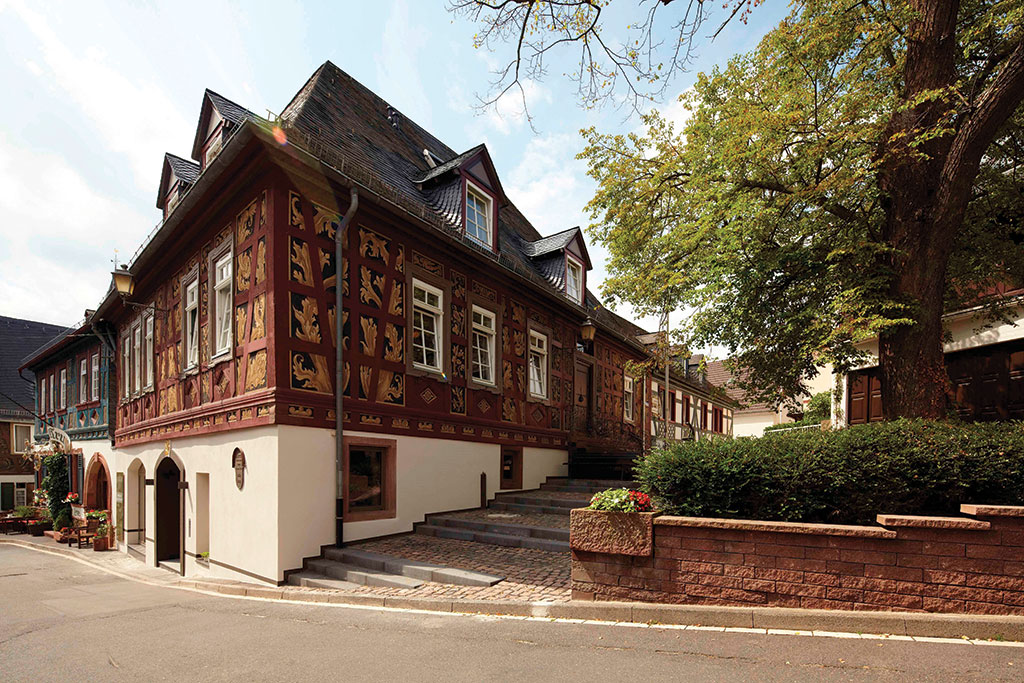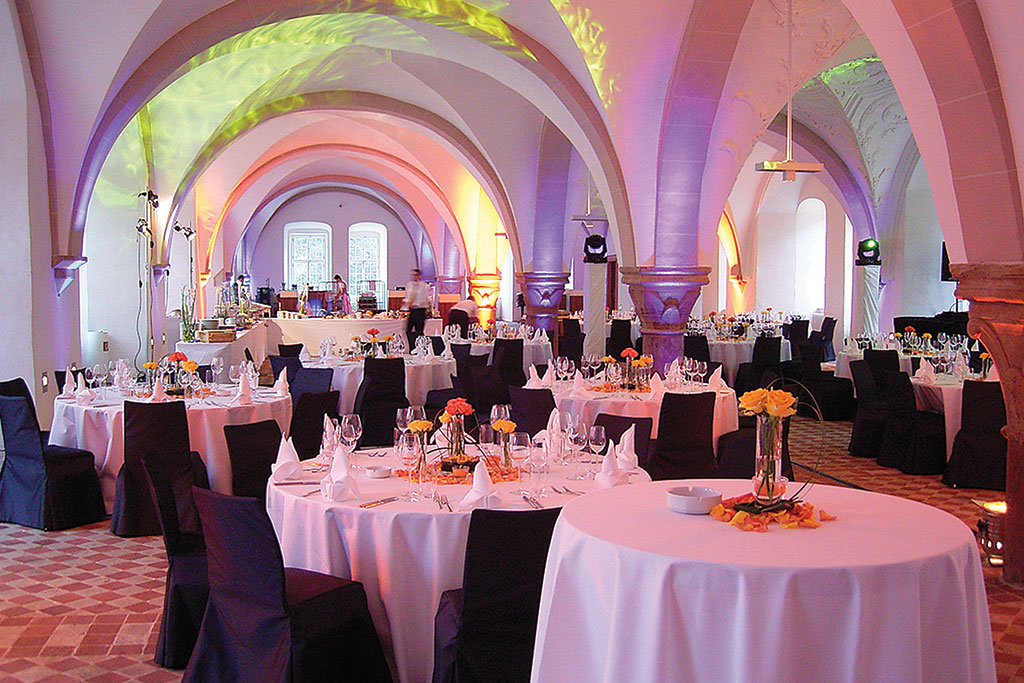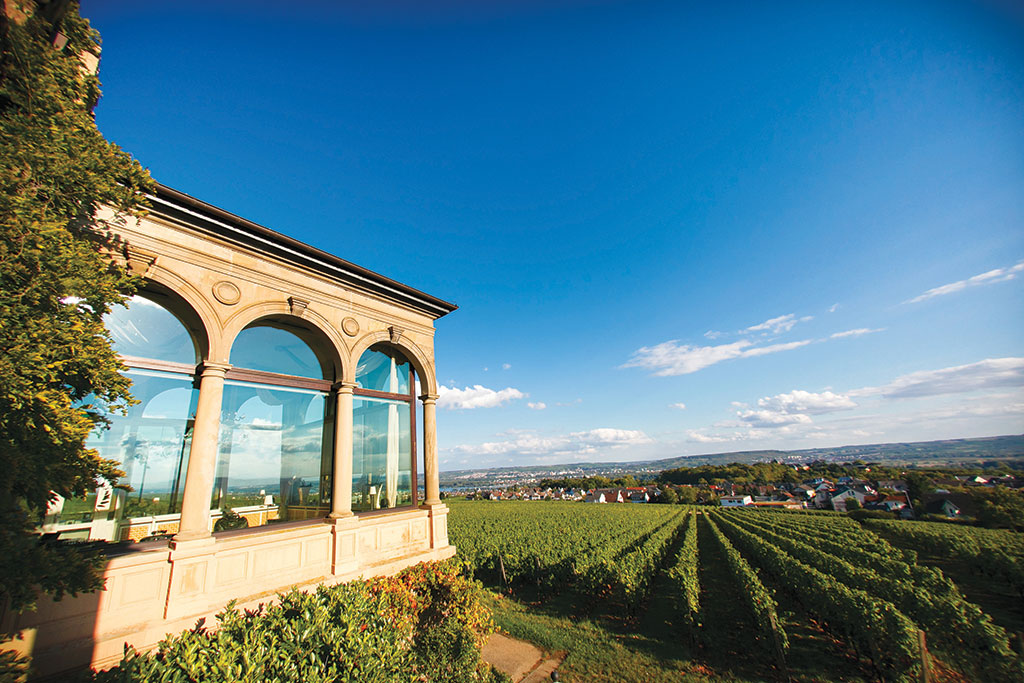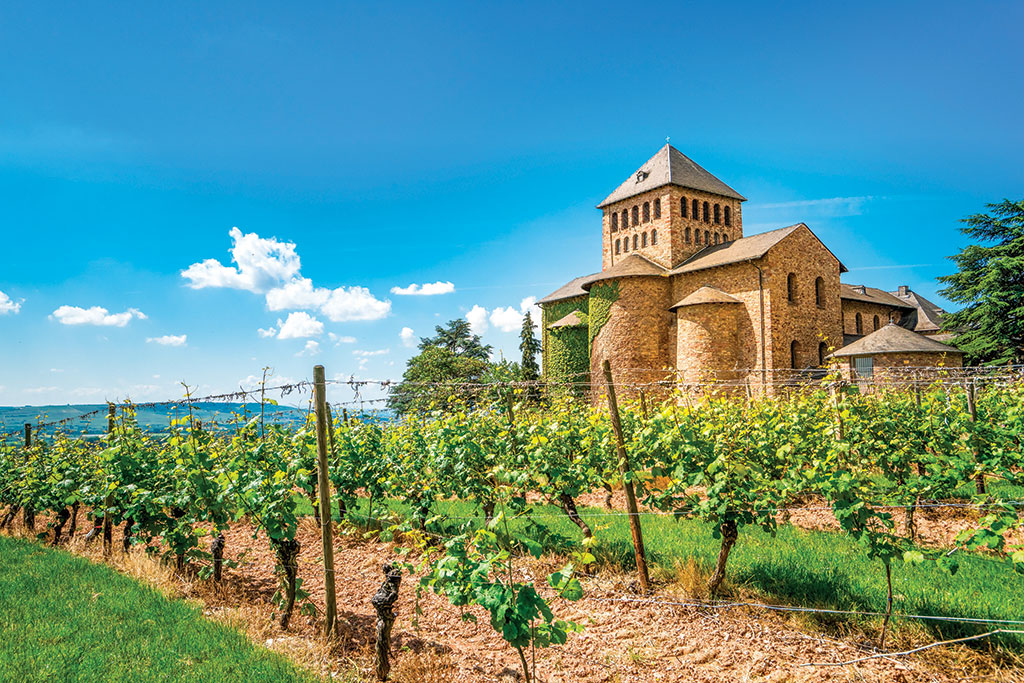Last summer, my husband and I decided it would be a good idea to rent a VW mini-van and take our parents on an 800mile tour of our favorite spots in Germany. I saw, but ignored, the Little Miss Sunshine warning signs. Unlike in the movie, thankfully, our cast of characters was relatively more stable, our car didn’t break down, and we ended the trip in the German Rheingau, not in Redondo Beach.
The Rheingau is a wine region just 25 miles from Frankfurt. It is known for its rolling hills, old castles, and exquisite Riesling wines. The Germans revere it for its elegance and “cost to value ratio.” I would be hard-pressed to think of another culture that does romanticism with better efficiency (full disclaimer, my husband is German).

Eltville
It’s also convenient to get to. Frankfurt is the primary hub for Lufthansa, so there are many non-stop Star Alliance flights from other major cities. Rent a car from the airport, drive 30 minutes, and you’re in the heart of German wine country.
Our nine-seater van looked quite out of place parked next to the Audi TTs in front of Zum Krug (www.hotel-zumkrug.de), my favorite hotel and restaurant in the Rheingau. The eight guestroom timber house is over 300 years old. Family owned, Zum Krug innovates while also holding onto its traditions. The menu is divided into the “classics” (e.g. blood sausages) and the “new” (e.g. baked goose with shellfish bisque). Five courses for 75 euros, plus 35 euros for wine pairings.
Before dinner, we went for a walk along the Rhine and through the town of Eltville (www.eltville.de/sprachen/english). It is an old medieval town with timber-framed houses lining cobbled streets. Roses bloom everywhere in June, and the peace and quiet here is enchanting.
Back from the walk, our two-day Riesling extravaganza began. In Somm: Into the Bottle, a documentary released in 2015 and available on Netflix, one master sommelier exclaims, “Holy shit! Riesling exceeds all expectations…why can’t other people see this?!” Another sommelier adds, “Somms have a love affair with Riesling because it’s crisp, it’s high acid, it’s mineral.”
Somehow, sometime, Riesling got branded as the sweet wine for American sorority girls. Nowadays, the Germans make this cheaper sweeter Riesling for export markets, though few Germans ever drink any of it themselves. They keep the good stuff here in the Rheingau. My husband and I always take some back with us when we travel through Germany. If you’re bringing wine back to the United States, just remember that US Customs limits each traveler to bringing one liter of alcohol into the US duty-free. Anything more needs to be declared and taxed. In my experiences, it’s worth the $2 extra per bottle for a good Rheingau Reisling.
There is good Riesling everywhere you turn in the Rheingau, to find the truly excellent bottles, I recommend referring to the Verband Deutscher Prädikatsweingüter, or the Association of German Prädikat Wine Estates, abbreviated as VDP (www.vdp.de/en/vdp). They call themselves “an elite group of some 200 qualityoriented German vintners who are committed to terroir-driven viticulture at the highest level,” and in the Rheingau they recommend just under 40 vineyards that have passed their strict quality benchmarks.


Zum Krug
Start at Kloster Eberbach (www.kloster-eberbach.de) for an overview of the region’s history, wines, and architecture. The building is a 12th-century Cisterian monastery where scenes from the 1986 film The Name of the Rose were filmed. This dramatic Romanesque architecture is now preserved by the state. Since 1998, Kloster Eberbach has been publicly owned, though not everybody has been happy about how much tax-payer money has been spent on renovating the old cellars. The monks who founded Kloster Eberbach were from Burgundy, and brought the Pinot Noir grapes with them. Though an estimated 85% of today’s wine production in the region is Reisling, there’s still a cult-following of Rheingau Pinot Noir. Taste both grape varieties at a private tasting in the candle-lit wine cellar of Kloster Eberbach, and ask to see the giant wooden wine presses from the 16th century.
For a more personal and exclusive experience, I recommend Weingut August Eser (www.eser-wein.de), a tenth-generation family-operated vineyard on the VDP top 40. The owner, Désirée, is the first woman in the family to manage the estate, and she is one of the only women managing any VDP estate. This is one of the excellent vineyards that mainly caters to loyal individual customers and high-end luxury restaurants. Bring back a few bottles because it’s expensive to procure in the US. The estate is open to visitors for guided tours, including a visit to their 300-year-old barrel cellar. Costs are 20 euros per person for a 1.5-hour guided tour that includes a tasting of six to eight wines (mostly Riesling, but also Pinot Noir upon request). Here, you can really get a chance to taste the difference between grapes grown in the different soils of the region.
The Rheingau is also great for biketours and hikes. Along the Rhine River, it’s hard to get lost. From Zum Krug, our hotel in Eltville, we walked west along the river heading towards another town called Kaub. Though we didn’t get close to finding all 18 castles along the 22-mile stretch, we meandered from town to town, popping into every cute hotel or restaurant we passed by to enjoy coffee and cake.
Make sure to visit two particularly idyllic estates: Schloss Vollrads (www.schlossvollrads.com) and Schloss Johannisberg (www.schloss-johannisberg.de/en). Both estates produce their own Riesling, which you can more or less assume to be true for every restaurant or hotel that you stop in the region.
Residents of this area told us that Goethe loved the walk between Schloss Vollrads to Schloss Johannisberg. Take a page out of his book: park at one estate, and finish your day with wine tastings at the other. The 30-minute walk back to your car should give you some time to sober up before you drive. Punishments for drunk driving in Germany are no joke.


Kloster Eberbach
For a more challenging hike, walk up the hills of the Taunus towards the Niederwald Monument, a 19th-century monument commemorating German reunification. The hike goes through quiet forests and breathtaking vineyards cultivated on steep rocky slopes. At the top, you get a view of the entire Rhine valley: the vineyards, the castles, the oak forest, and the river. For other recommended routes and maps, take a look at Rheinsteig (www.rheinsteig.de).
In the Rheingau, wine is the main character and food the supporting actor, but there are a few restaurants worthy of mention. Alderwirtschaft (www.franzkeller.de/essen) and Kornenschlösschen (www.kronenschloesschen.de) are widely respected for their quality and consistency. Their menu items capture traditional flavors of the region and are lightly spiced.
The new player in the food scene is Nils Henkel, who previously was awarded two Michelin stars at Schloss Lerbach. In February 2017, he moved to the Rheingau to begin as head chef of Burg Schwarzenstein (www.burg-schwarzenstein.de).
Summer is the liveliest time to visit the Rheingau. Put on your top hat and grab your parasol for the Sekt Festival in Eltville (www.rheingau.de/veranstaltungen/feste/sektfest-eltville), scheduled for June 30-July 3, 2017. Musicians play across the region’s public spaces and estates for the Rheingau Music Festival (www.rheingau-music-festival.de), with performances scheduled from June through the end of August. There’s also an alternative music festival called Heimspiel Knyphausen (www.gutshotelbaron-knyphausen.de), scheduled for July 21-23, in 2017. Imagine alternative German rock at an aristocratic estate, served with Riesling.
Many websites for hotels and restaurants in the Rheingau are not available in English, but don’t let that scare you. Almost everybody in the region speaks English (German education, like its wine production, is methodical and comprehensive). You can spontaneously visit just about any restaurant or vineyard for a meal or a wine tasting even if you only speak a few words of German.


Burg Schwarzenstein
For more structure, arrange a guided tour with Kai’s Rhine Valley (www.weintouren-im-rheingau.de), a one-man show that specializes in tours for international guests.
“There’s a little revolution happening in the Rheingau,” Dodo Freiherr zu Knyphausen explains to me. A few years ago, younger generations, such as Mr. Knyphausen’s wife Désirée, started to take over the family businesses and began to take a more modern approach to running the business. Traditions are being kept, but also reinterpreted. Now is the time to visit, as more and more sleepy towns along the Rhine start to wake up. Whether for a romantic weekend escape, a celebration with friends, or some quiet time alone, you really can’t go wrong here.
I not only survived this 800-mile road trip with my parents and in-laws, but each of us enjoyed every minute of our time together, and the people we met along the way.


